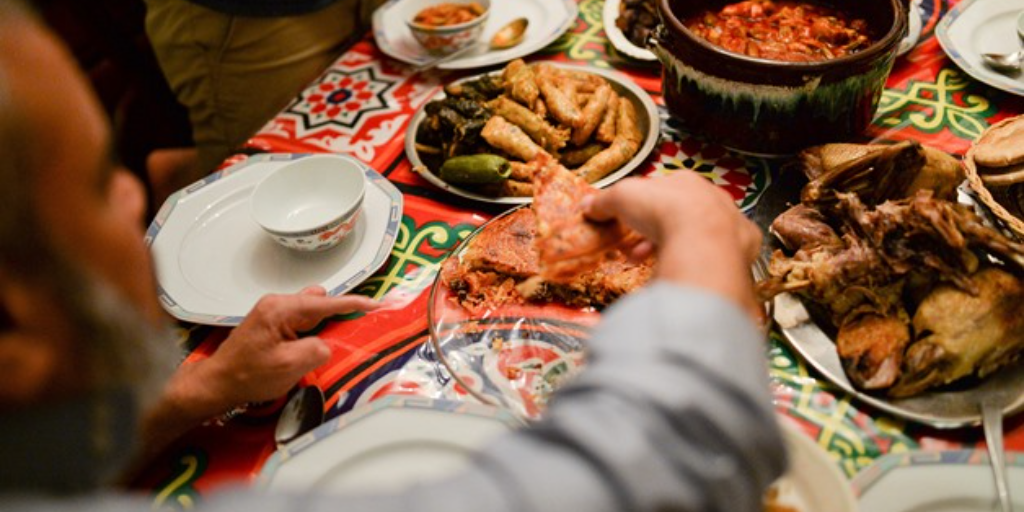The 2011 Egyptian comedy ‘X-Large’ stars Ahmed Helmy in the role of Magdy, an obese cartoonist whose half-hearted attempts at dieting are each cut short by his own gluttony and low self-worth.
Eventually, the death of a loved one, coupled with a traumatic breakup, push Magdy to take drastic steps towards losing weight. In the process, he draws the comic book that propels his career to new heights, lifting him out of a deep depression.
Watching ‘X-Large’ as a teenager, my main takeaway from the film was that happiness and professional achievement could only come within Magdy’s reach once he had – quite literally – shed the weight of his own self-doubt. His obesity was first and foremost a moral failing; a symptom of poor discipline and self-esteem.
This portrayal is in line with the deeply problematic way that fatness is seen in Egypt: as far back as the 1940s, obese characters in popular media have often been shown as corrupt and unintelligent. These stereotypes are not confined to the screen, but also bleed into the real world.
Speaking to The Arab Weekly in 2019, sociologist Samia Al Saati explained that overweight people in Egypt face many social repercussions for their appearance, including employment discrimination, difficulty finding a spouse, and a higher likelihood of divorce.
Fatphobia anywhere in the world should be condemned and it should not be revolutionary to say that all bodies are worthy of celebration, regardless of their size and shape. In Egypt, however, fatphobia and diet culture are not just two facets of toxic, misogynistic beauty standards, they are also symptoms of deepening class inequalities – ones which take physical form in our bodies.
How Diet Culture Ignores Food Insecurity
According to the “100 million health” survey conducted by the Ministry of Health in 2018, nearly 40 percent of Egyptian adults suffer from obesity: the highest rate in the Arab World, and one of the highest globally. Official responses to the issue largely adopted an accusatory tone, attributing Egypt’s obesity epidemic to poor lifestyle choices, gluttony, or laziness.
In parallel, the local diet craze has taken on new dimensions in recent years. Health stores, trainers, and pseudo experts online and off have sprung up in Egypt to promote weight loss by way of juice detoxes, fad diets, and vigorous exercise regimens.
To most Egyptians, the paternalistic lectures of diet culture are far divorced from reality. While in theory, balanced nutrition and exercise can help one maintain a healthy weight, what this mindset ignores is the role that economic status plays in determining weight.
Though it may seem counterintuitive, lacking access to food is the main reason for obesity, and as of today, food insecurity impacts over thirty million Egyptians. In March of this year, fruit and vegetable prices surged respectively by 26.2 and 17.5 percent, while prices of poultry and meat rose by 95 percent, becoming unaffordable luxuries.
Due to mounting price barriers, over 70 percent of Egyptians now rely on food subsidies, while government and NGO feeding programs provide a lifeline to millions. According to the International Food Policy Research Institute, these programs focus on calorie-rich, filling staples, like carbohydrates, but offer limited nutritional value.
In short, the only food items accessible to many citizens are ones that induce weight gain in a drastically undernourished body, hence obesity being most prevalent among those living under the poverty line.
For this reason, UNICEF describes obesity in Egypt as a double-burden: due to the inaccessible cost of nutritionally balanced diets, low-income people are more likely to be obese and develop associated health adversities, such as diabetes and coronary heart disease.
These challenges not only pose a serious risk to a person’s health, but also force them to accrue medical expenses and inhibit their ability to work – sending them into further poverty and increasing their vulnerability to fatphobic discrimination.
An Adversarial Urban Landscape
Another important factor at play in determining national weight averages is the privatization of public space. In 2019, a study conducted by the World Bank found that obesity rates were substantially higher in urban than rural areas.
Speaking to Egypt Independent, former director of the National Nutrition Institute, Zeinab Bakry, explained the reason for this discrepancy, saying, “In rural areas you have green space and you have a place to walk, to be active, which is completely different than urban areas. [In Cairo], if you try to walk in the street, there is no room.”
In Cairo’s urban metropolis – home to nearly 25 percent of Egypt’s population – public pedestrian spaces are increasingly making way for new roads and commercial venues. Although only 10 percent of households own private cars, the ongoing mass construction of new roads caters less to people than to vehicles, making the city increasingly less walkable.
Despite government efforts to revamp affordable sporting facilities and promote exercise, poorer areas of the capital, where sidewalks are notoriously sparse, are still lacking in public parks, sports centers, or green open spaces.
It is, therefore, no wonder that high rates of physical inactivity prevail among Egypt’s urban population, and that calls to hit the gym mostly fall on deaf ears.
The Colonial Roots of Fatphobia
Beauty standards are ever-changing, but one global trend which has not seemed to wane over many decades is a general contempt for fatness and obesity. The source of this fatphobia, like countless social phenomena in Egypt, is colonialism.
In the Western world, advocates of the body positivity movement, led by women of color, have long sought to shed light on the racist origins of fatphobia. In her 2019 book, ‘Fearing the Black Body: The Racial Origins of Fatphobia,’ sociologist Sabrina Stings traces back this standard to the writings of early race scientists in the 17th century.
In trying to prove the inherent inferiority of colonized peoples, these writers argued that there were direct ties between gluttony, stupidity, and the ‘sensuous figures’ of African people – arguments which were later deployed against Middle Easterners, too. Europeans, meanwhile, strove to be slimmer as proof of their moral superiority.
In Egypt, despite having formally gained independence from Britain over a century ago, one lingering determinant of class is still proximity to this former colonial occupier. The same forces driving wealthier citizens to speak English rather than Arabic, or rampant racial discrimination, are also at the root of fatphobia.
The social contempt for fatness has often taken extreme turns, such as the Egyptian Radio and Television Union’s 2016 decision to impose a mandatory diet on female anchors to achieve an “appropriate appearance,” and prevent eight presenters from appearing on screen until they met this standard.
The same year, a Facebook post shared by Gold’s Gym, one of Egypt’s most popular fitness facilities, sparked widespread controversy. The post showed a photo of a pear with the caption “this is no shape for a girl.” The image was seen to shame ‘pear shaped’ women, whose weight is concentrated in their lower bodies – or, the majority of Egyptian women.
Besides their overt cruelty, what comments like the above do is reinforce beauty standards inherited from a deeply racist, classist system of colonial subordination. Fatphobia not only promotes the idea that one body type is worthier than another, but also that western bodies are worthier than their non-western counterparts.
Weight is never a moral failure, but fatphobia is
Today, as summer rolls around and the holiday season grows near, many of those who can still afford a vacation are actively slimming down for the beach. Meanwhile, over thirty million Egyptians are struggling to keep hunger at bay. It should not be controversial to point out the cruel irony in this.
I do not believe that there is anything morally reprehensible about seeking to eat a certain way, or even to look a certain way. The blame for disparities in food security certainly does not fall on individuals, but rather, on a struggling economy and health infrastructure.
Nonetheless, in a country where beauty standards have been shaped by centuries of colonial occupation and balanced nutrition remains inaccessible to most people, painting weight gain or weight loss as a moral failure is not just toxic – it’s also plainly unethical.
The opinions and ideas expressed in this article are the author’s and do not necessarily reflect the views of Egyptian Streets’ editorial team. To submit an opinion article, please email [email protected].







Comment (1)
[…] many Egyptian women, she acknowledged facing numerous challenges when shopping, including limited size availability, high prices, […]